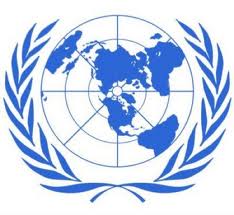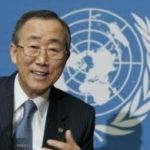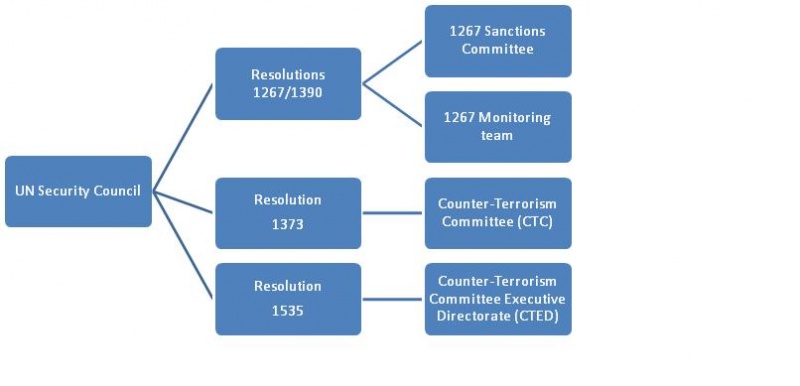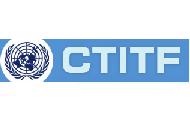 Terrorism has been on the modern international agenda since 1934, when the League of Nations discussed a draft convention for the prevention and punishment of terrorism. More recently, the United Nations (UN) has introduced a number of robust sanctions and anti-terror programs. These initiatives make up the bulwark of the UN’s efforts, but many were created with little transparency and are routinely criticized for violating fundamental norms of due process and insufficiently respecting human rights. Other tools, like the UN Global Counter-Terrorism Strategy, call on all UN members to undertake measures against terrorism, but to do so “in accordance with the Charter of the UN and the relevant provisions of international law, including international standards of human rights.”
Terrorism has been on the modern international agenda since 1934, when the League of Nations discussed a draft convention for the prevention and punishment of terrorism. More recently, the United Nations (UN) has introduced a number of robust sanctions and anti-terror programs. These initiatives make up the bulwark of the UN’s efforts, but many were created with little transparency and are routinely criticized for violating fundamental norms of due process and insufficiently respecting human rights. Other tools, like the UN Global Counter-Terrorism Strategy, call on all UN members to undertake measures against terrorism, but to do so “in accordance with the Charter of the UN and the relevant provisions of international law, including international standards of human rights.”
The purpose of this document is to provide basic information about the major pieces of the UN Counterterrorism framework, including UN Security Council Resolutions and the UN Global Counter-Terrorism Strategy.
The General Assembly, composed of representatives of all 193 members, is the UN’s central deliberative body, empowered to make recommendations on any subject falling within the scope of the UN Charter.
The Security Council, a 15 member body, has primary responsibility for maintaining international peace and security. It is empowered to act on behalf of all UN members and to decide on a course of collective action that is mandatory for the entire membership. Five countries are permanent members: United States, China, France, the United Kingdom, and Russia. The remaining Security Council members are elected by the General Assembly for two-year terms.
The
UN Secretary-General is described by the UN Charter as “chief administrative officer” of the UN. The Charter also empowers the

Secretary-General to “bring to the attention of the Security Council any matter which in his opinion may threaten the maintenance of international peace and security.” The current Secretary-General is Ban Ki-moon.
The
Human Rights Council is responsible for addressing human rights violations around the world. It is made up of 47 UN members who are elected by the General Assembly. The Human Rights Council replaced the former United Nations Commission on Human Rights.
The
UN Charter sets out basic principles of international relations, defining the role of the UN as to maintain international peace and security, promote respect for human rights and to be a center for harmonizing the actions of nations. Its
Chapter VII, which deals with “action with respect to threats to the peace, breaches of the peace, and acts of aggression,” authorizes the Security Council to set up committees to monitor compliance by member states with its resolutions.
Under the UN Charter, the Security Council has the primary responsibility for passing measures to address terrorism as a threat to international peace and security.
In October 1999 the Security Council adopted
Resolution 1267 imposing sanctions against members of al-Qaida and the Taliban. Under this regime, the Security Council requires all UN members to impose an assets freeze, a travel ban, and an arms embargo on individuals and entities who have been placed on the
1267 Committee List. As of March 2011, this list included 395 individuals and 92 entities and other groups associated with the Taliban or al-Qaida. Initially, there were no guidelines governing the 1267 Committee List; anyone could be added and there were few procedures for being de-listing (See Agnieszka Grossman’s
Critical Assessment of the 1267 Sanctions Committee for a comprehensive history and analysis of 1267 with a human rights perspective).
In January 2002, Security Council
Resolution 1390 expanded the authority of the 1267 Committee and imposing targeted sanctions against additional individuals and entities. To monitor and assist with implementation of the 1267 sanctions, the Security Council created the
Analytical Support and Sanctions Monitoring team (1267 Monitoring team).
Resolution 1373 was introduced three weeks after 9/11 and imposed dozens of binding counter-terrorism obligations on all UN members. Passed under the auspices of Chapter VII of the UN Charter, 1373 requires all UN members to freeze the financial assets of terrorists and their supporters, deny them travel or safe haven, prevent terrorist recruitment, and cooperate in sharing intelligence. No timeframe or end date for these sanctions was given.
This resolution also established the Security Council’s
Counter-Terrorism Committee (CTC). Lack of clarity about its mandate and powers initially made the
U.S. a reluctant supporter of the CTC, but it has steadily become one of the key cogs in the Security Council’s counterterrorism framework. The CTC monitors each member’s compliance with 1373’s counterterrorism provisions, specifically focusing on anti-terrorist financing, and immigration and border capacities of member countries.

To assist the CTC with the assessments on each member country, the Counter-Terrorism Committee Executive Directorate (CTED) was created by
Resolution 1535. According to the
Security Council’s website, CTED consists of an administrative office and five working groups that focus on “technical assistance; terrorist financing; border control, arms trafficking and law enforcement; general legal issues, including legislation, extradition and mutual legal assistance.”
As part of its work, CTED organizes
regional workshops that bring together different stakeholders who share common interests. In this process, opportunities exist for civil society to participate and bring attention to concerns in peacebuilding, economic development, women’s rights, and other important issues that are sometimes left out of the counterterrorism conversation.
Other key Security Council resolutions include:
The General Assembly plays a significant role setting standards and codifying international law. Over the years, along with adopting resolutions, the General Assembly has approved 16 universal legal instruments (there are 14 additional regional instruments) establishing mandates for UN members related to the prevention and suppression of international terrorism. For example, instrument no. 10, the 1999 International Convention for the Suppression of the Financing of Terrorism (Terrorist Financing Convention):
After 9/11, many UN members expressed concern that the Security Council led counterterrorism framework was usurping the authority of the General Assembly and largely limiting its focus to security measures. In response, the General Assembly voted unanimously in September 2006 to adopt the UN Global Counter-Terrorism Strategy (Strategy), which advances a more holistic approach than the Security Council regime.
The UN Global Counter-Terrorism Strategy
 Moving beyond preventing and combating terrorism solely through traditional legal and law enforcement contexts, the 2006 United Nations Global Counter-Terrorism Strategy recognizes the need to complement security concerns with action that addresses the conditions that may be conducive to spreading violent extremism. Respect for human rights, the prevention and resolution of conflicts, the promotion of the rule of law, development work, education programs, and the promotion of dialogue are some of the areas the Strategy recognizes as key concerns in both individual and collaborative efforts to counterterrorism.
Moving beyond preventing and combating terrorism solely through traditional legal and law enforcement contexts, the 2006 United Nations Global Counter-Terrorism Strategy recognizes the need to complement security concerns with action that addresses the conditions that may be conducive to spreading violent extremism. Respect for human rights, the prevention and resolution of conflicts, the promotion of the rule of law, development work, education programs, and the promotion of dialogue are some of the areas the Strategy recognizes as key concerns in both individual and collaborative efforts to counterterrorism.
The Strategy consists of four pillars:
In September 2008, the General Assembly issued a
resolution reaffirming “the United Nations Global Counter-Terrorism Strategy and its four pillars,” and encouraged “non-governmental organizations and civil society to engage, as appropriate, on how to enhance efforts to implement the Strategy.”
Two years later, the General Assembly conducted the
second biennial review of the Strategy, reiterating that it remains the strategic framework and practical guidance on joint international efforts to counter terrorism. It also recognized the need to enhance the role of the UN, including the
Counter-Terrorism Implementation Task Force(CTITF), with other international and regional organizations in international counterterrorism efforts.
Counter-Terrorism Implementation Task Force (CTITF)
 To assist UN members with the implementation its counterterrorism efforts, the UN Secretary General created the Counter Terrorism Implementation Task Force (CTITF)in 2005. The CTITF works to ensure overall coordination and coherence among at least two dozen entities throughout the UN system involved in counter-terrorism efforts. CTITF has a large mandate but limited staff and capabilities. The General Assembly has called for enhancing the role of the Task Force and strengthening its coordination and capacity-building efforts.
To assist UN members with the implementation its counterterrorism efforts, the UN Secretary General created the Counter Terrorism Implementation Task Force (CTITF)in 2005. The CTITF works to ensure overall coordination and coherence among at least two dozen entities throughout the UN system involved in counter-terrorism efforts. CTITF has a large mandate but limited staff and capabilities. The General Assembly has called for enhancing the role of the Task Force and strengthening its coordination and capacity-building efforts.
CTITF has developed working groups to help UN members implement the strategy. Working groups including:
The CTITF includes representatives from 31 international entities, including: Counter-Terrorism Committee Executive Directorate (CTED), the Department of Peacekeeping Operations (DPKO), the Department of Political Affairs (DPA), the Department of Public Information (DPI), the International Monetary Fund (IMF), the 1267 Monitoring team, the Office of the High Commissioner for Human Rights (OHCHR), the Special Rapporteur on the Promotion and Protection of Human Rights while Countering Terrorism, the United Nations Development Program (UNDP), the World Bank, and the International Criminal Police Organization (INTERPOL). More about some of these groups in Other UN entities
The Global Counterterrorism Forum
The Global Counterterrorism Forum (GCTF) is a multilateral body with 30 founding members (29 countries plus the European Union) from around the world. Started in September 2011, the GCTF assists with implementation of the UN Global Counter-Terrorism Strategy, and is a leading body on non-military multilateral action against terrorism. It is still in its infancy, but it has been reported that it will host three regional and two thematic working groups, the latter focusing on the rule of law and the prevention of violent radical extremism. The State Department’s GCTF “
Fact Sheet” and related
documents (reports, speeches, etc) are available.
With its primary focus on capacity building, the GCTF aims to increase the number of countries capable of dealing with the terrorist threats within their borders and regions. The GCTF will facilitate sharing of best practices as part of a sustained effort to help the international community meet identified counterterrorism capacity building needs. It will also sponsor a multilateral training and research center on violent prevention, to be based in Abu Dhabi.
Protecting Human Rights While Countering Terrorism
With many of the Security Council resolutions and other tools the focus of the counterterrorism approach is weighted toward security concerns. But the protection of human rights and respect for the rule of law while combating terrorism has also been addressed by the UN, bringing the overall counterterrorism framework towards a more balanced and comprehensive approach.
In his April 2006 report “
Uniting Against Terrorism: Recommendations for a Global Counterterrorism Strategy,” the UN Secretary-General said respecting human rights is essential to the fulfillment of all aspects of a counter-terrorism strategy and emphasized that “effective counter-terrorism measures and the protection of human rights are not conflicting goals, but complementary and mutually reinforcing ones.”
The Security Council has also incorporated basic human rights protections in their programs. In
Resolution 1456(2003) the Security Council said that UN members “must ensure that any measure taken to combat terrorism comply with all their obligations under international law, and should adopt such measures in accordance with international law, in particular international human rights, refugee, and humanitarian law.” This position has been reaffirmed in other resolutions, such as Security Council
Resolution 1624 (2005).
In May 2006, the Counter-Terrorism Committee (CTC) adopted human rights
policy guidance, saying it and its Executive Directorate (CTED) should:
The policy guidance also noted that the CTC and CTED “should incorporate human rights into their communications strategy, as appropriate, noting the importance of States ensuring that in taking counter-terrorism measures they do so consistent with their obligations under international law, in particular human rights law, refugee law and humanitarian law, as reflected in the relevant Security Council resolutions.”
The UN Human Rights Commission (now called the Human Rights Council) in 2005 appointed a
Special Rapporteur on the Promotion and Protection of Human Rights and Fundamental Freedoms while Countering Terrorism. This position works to identify best practices on counterterrorism measures that respect human rights and fundamental freedoms. The Special Rapporteur conducts country visits and raises allegations of human rights violations in the course of countering terrorism. He reports regularly to the Human Rights Council and the General Assembly. One
report from October 2010, found that the UN Security Council’s counterterrorism framework is having a “chilling effect” on humanitarian aid, the charities that provide it, and undermines the protection of human rights around the world. The report described Security Council Resolutions 1267 and 1373 as exceeding their intended scopes and concluded they “pose risks to the protection of a number of international human rights standards.”
The Special Rapporteur has also been critical of the limited powers of the UN Ombudsperson position. This position was created by
Security Council Resolution 1904 in 2009 to improve the process for people seeking redress from being placed on the terrorist list. According to the Special Rapporteur report, the Ombudsperson does not have the necessary authority to challenge Security Council decisions on blacklisting people or entities for suspected ties to terrorists. “The Ombudsperson is not even mandated to make recommendations to the Committee, and de-listing decisions are still taken confidentially,” the report said. Kimberly Prost, a Canadian judge, was selected as the first Ombudsperson in June 2010.
In a report critical of the UN 1267 Sanctions Regime (1267), released in November 2012, the UN Special Rapporteur identified several key deficiencies in the listing and de-listing process. He wrote that the United Nations’ Security Council targeted sanctions regime “continues to fall short of international minimum standards of due process.” He recommends that the Security Council introduce a “sunset clause” imposing a time limit on the duration of all designations and also called for amendments to the mandate of the 1267 Ombudsperson’s office to incorporate minimal international standards of due process for delisting petitions.
All of the following entities are members of Counter-Terrorism Implementation Task Force (CTITF):
The
UN Department of Political Affairs (DPA) has facilitated peace agreements in 13 conflicts around the world since 2001. The Department’s Mediation Support Unit and the Peacebuilding Support Office enhances the UN’s peacemaking and peacebuilding capacity.
The
UN Department of Public Information (DPI) works with UN members, media, educational institutions, non-governmental organizations and civil society to promote dialogue, respect, tolerance and cultural diversity. For example, DPI organizes a series of seminars entitled “Unlearning Intolerance,” aimed at examining different manifestations of intolerance, as well as exploring means to promote respect and understanding among peoples. The five seminars held so far focused on: confronting anti-Semitism and Islamophobia, the role of the media in “fanning the flame of tolerance,” preventing genocide and the role of political cartoonists.
With its field presence in 166 countries, the
UN Development Program (UNDP) undertakes numerous activities to promote governance and rule of law, including programs to support the implementation of anti-money-laundering legislation and the strengthening of justice systems.
The
UN Department of Peacekeeping Operations (DPKO) provides training to national police and law enforcement officers and officials on criminal matters including kidnapping, information-gathering, hostage-taking, close protection, and the investigation of assassinations, murders and bombings.
The
International Monetary Fund (IMF) has conducted, since early 2002, 61 country assessments on Anti-Money-Laundering and Combating the Financing of Terrorism (AML/CFT) capacity. The Fund has provided technical assistance to 222 countries, through national and regional training workshops and tailored capacity-building assistance such as drafting of legislation and strengthening of financial sector supervision for AML/CFT.
The
World Bank has conducted 32 assessments – 11 jointly with the IMF – on Anti-Money-Laundering and Combating the Financing of Terrorism (AML/CFT) compliance since 2001. Throughout this period, approximately 275 technical assistance missions were performed on a bilateral or regional basis to strengthen all components of an AML/CFT regime.
The International Criminal Police Organization (INTERPOL) is not part of the UN system, but it is a member of CTITF. It provides a forum for counterterrorism experts to exchange best practices, as well as operational information, in order to identify active terrorist groups and their membership, including organizational hierarchies, methods of training, financing and recruitment of terrorist suspects and groups. It also coordinates the circulation of alerts and warnings on suspected or wanted terrorists and assists the UN Security Council with the implementation of the Al-Qaida and Taliban sanctions regime by circulating relevant information on individuals under UN sanctions to law enforcement authorities worldwide.
 Terrorism has been on the modern international agenda since 1934, when the League of Nations discussed a draft convention for the prevention and punishment of terrorism. More recently, the United Nations (UN) has introduced a number of robust sanctions and anti-terror programs. These initiatives make up the bulwark of the UN’s efforts, but many were created with little transparency and are routinely criticized for violating fundamental norms of due process and insufficiently respecting human rights. Other tools, like the UN Global Counter-Terrorism Strategy, call on all UN members to undertake measures against terrorism, but to do so “in accordance with the Charter of the UN and the relevant provisions of international law, including international standards of human rights.”
Terrorism has been on the modern international agenda since 1934, when the League of Nations discussed a draft convention for the prevention and punishment of terrorism. More recently, the United Nations (UN) has introduced a number of robust sanctions and anti-terror programs. These initiatives make up the bulwark of the UN’s efforts, but many were created with little transparency and are routinely criticized for violating fundamental norms of due process and insufficiently respecting human rights. Other tools, like the UN Global Counter-Terrorism Strategy, call on all UN members to undertake measures against terrorism, but to do so “in accordance with the Charter of the UN and the relevant provisions of international law, including international standards of human rights.” Secretary-General to “bring to the attention of the Security Council any matter which in his opinion may threaten the maintenance of international peace and security.” The current Secretary-General is Ban Ki-moon.
Secretary-General to “bring to the attention of the Security Council any matter which in his opinion may threaten the maintenance of international peace and security.” The current Secretary-General is Ban Ki-moon.
 Moving beyond preventing and combating terrorism solely through traditional legal and law enforcement contexts, the 2006 United Nations Global Counter-Terrorism Strategy recognizes the need to complement security concerns with action that addresses the conditions that may be conducive to spreading violent extremism. Respect for human rights, the prevention and resolution of conflicts, the promotion of the rule of law, development work, education programs, and the promotion of dialogue are some of the areas the Strategy recognizes as key concerns in both individual and collaborative efforts to counterterrorism.
Moving beyond preventing and combating terrorism solely through traditional legal and law enforcement contexts, the 2006 United Nations Global Counter-Terrorism Strategy recognizes the need to complement security concerns with action that addresses the conditions that may be conducive to spreading violent extremism. Respect for human rights, the prevention and resolution of conflicts, the promotion of the rule of law, development work, education programs, and the promotion of dialogue are some of the areas the Strategy recognizes as key concerns in both individual and collaborative efforts to counterterrorism.
